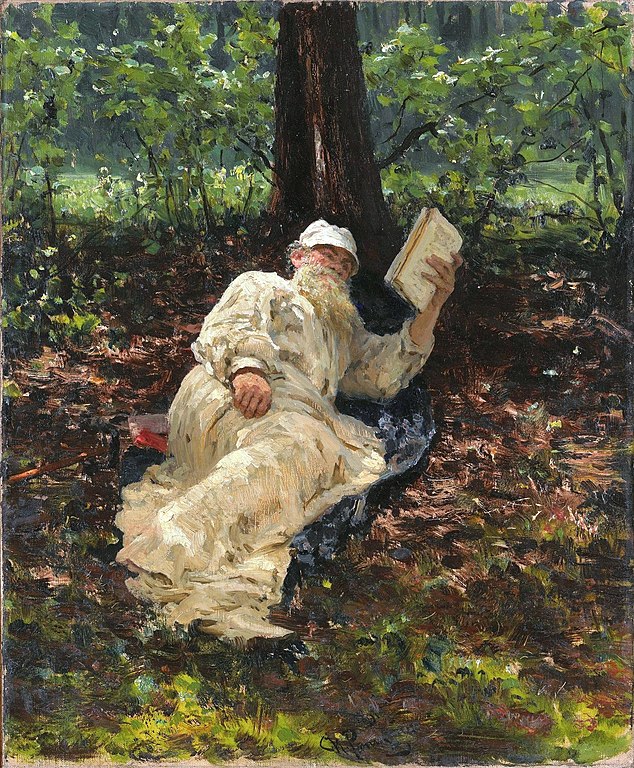Leo Tolstoy Archive
Written: 1899
Source: Anna Karenina, by Leo Tolstoy, translated from Russian to English by Constance Clara Garnett
Transcription/Markup: Andy Carloff
Online Source: RevoltLib.com; 2021

Nekhludoff had been waiting for a long time in the vestibule.
Arriving at the prison he rang the front-door bell and handed his pass to the warden on duty.
"What do you want?"
"I wish to see the prisoner Maslova."
"Can't see her now; the inspector is busy."
"In the office?" asked Nekhludoff.
"No, here in the visitors' room," the warden answered, somewhat embarrassed, as it seemed to Nekhludoff.
"Why, are visitors admitted to-day?"
"No—special business," he answered.
"Where can I see him, then?"
"He will come out presently. Wait."
At that moment a sergeant-major in bright crown-laced uniform, his face radiant, and his mustache impregnated with smoke, appeared from a side door.
"Why did you admit him here? What is the office for?" he said sternly, turning to the warden.
"I was told that the inspector was here," said Nekhludoff, surprised at the embarrassment noticeable on the officer's face.
At that moment the inner door opened and Petroff, flushed and perspiring, came out.
"He will remember it," he said, turning to the sergeant-major.
The latter pointed with his eyes to Nekhludoff, and Petroff became silent, frowned and walked out through the rear door.
"Who will remember? What? Why are they all so embarrassed? Why did the sergeant make that sign?" thought Nekhludoff.
"You cannot wait here; please walk into the office," the sergeant-major turned to Nekhludoff, who was about to go out when the inspector came in through the inner door, more embarrassed even than his assistants. He was sighing incessantly. Seeing Nekhludoff, he turned to the warden:
"Fedotoff, call Maslova."
"Follow me, please," he said to Nekhludoff. They passed up a winding stairway leading into a small room with one window and containing a writing table and a few chairs. The inspector sat down.
"Mine are disagreeable duties," he said, turning to Nekhludoff and lighting a thick cigarette.
"You seem tired," said Nekhludoff.
"I am very tired of all this business; my duties are very onerous. I am trying my best to alleviate the condition of the prisoners and things are getting only worse. I am very anxious to get away from here; the duties are very, very unpleasant."
Nekhludoff could not understand what it was that made it so unpleasant for the inspector, but to-day he noticed on the inspector's face an expression of despondency and hopelessness which was pitiful to behold.
"Yes, I think they are very trying," he said. "But why do you not resign?"
"I have a family and am without means."
"But if it is difficult——"
"Well, you see, I manage to improve somewhat their lot after all. Another one in my place would hardly exert himself as I do. It is no easy matter to handle two thousand people. They are also human and one feels pity for them, and yet they can't be allowed to have all their own way."
And the inspector related the case of a recent fight among the prisoners which ended in murder.
His story was interrupted by the entrance of Maslova, who was preceded by the warden.
Nekhludoff got sight of her when she appeared on the threshold and before she saw the inspector. Her face was red, and she walked briskly behind the warden, smiling and shaking her head. Noticing the inspector she gazed at him with frightened face, but immediately recovered herself and boldly and cheerfully turned to Nekhludoff.
"How do you do?" she said, drawlingly, smiling and vigorously shaking his hand, not as on the former occasion.
"Here I have brought you the petition to sign," said Nekhludoff, somewhat surprised at the forward manner in which she accosted him. "The lawyer wrote it. It must be signed and sent to St. Petersburg."
"Why, certainly. I will do anything," she said, winking one eye and smiling.
"May she sign it here?" Nekhludoff asked of the inspector.
"Come here and sit down," said the inspector. "Here is a pen for you. Can you write?"
"I could write once," she said, smiling, and, arranging her skirt and waist-sleeve, sat down, clumsily took the pen into her small, energetic hand, began to laugh and looked round at Nekhludoff.
He pointed out to her where to sign.
Diligently dipping and shaking the pen she signed her name.
"Do you wish anything else?" she asked, looking now at Nekhludoff, now at the inspector, and depositing the pen now on the ink-stand, now on the paper.
"I wish to tell you something," said Nekhludoff, taking the pen from her hand.
"Very well; go on," she uttered, and suddenly, as though meditating or growing sleepy, her face became grave.
The inspector rose and walked out, leaving Nekhludoff with her alone.